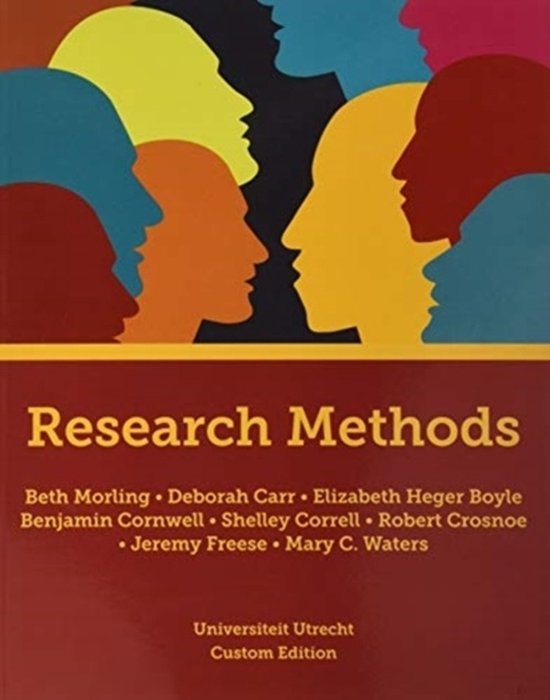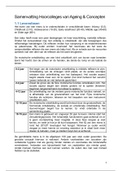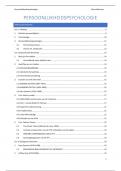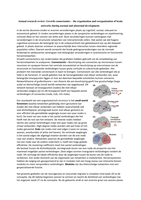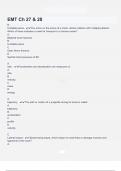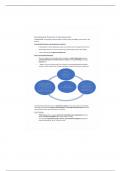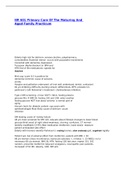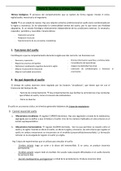Samenvatting methodenleer tentamen
Verschillende bronnen kennis
1. Intuïtie
2. Persoonlijke ervaring -> niet goed vanwege confounds en geen vergelijkingsgroep
3. Autoriteit
Vaak confirmation bias = alleen kijken naar bewijs dat je mening ondersteunt
Vaak present/present bias = enkel focussen op momenten dat beide variabelen aanwezig
zijn
Confound = factor waar je op focust varieert systematisch mee met andere factoren, hierdoor
alternatieve verklaring
Empirische cyclus
Observatie = verzamelen en groeperen van empirische feiten
Theorie/inductie = vorm theorie obv observaties (specifiek
naar algemeen)
Voorspelling/deductie = leidt een toetsbare voorspelling af uit
theorie
Evaluatie = wat betekenen de onderzoeksuitkomsten voor de
theorie?
Falsificeerbaarheid = observaties tegen theorie moeten mogelijk zijn
Evaluatie
- Als een voorspelling uitkomt, is de theorie niet weerlegd.
- Theorie bewijzen vrijwel onmogelijk want:
o Je kan nooit alle alternatieve verklaringen uitsluiten
o Je gaat slechts 1 concrete voorspelling na
- Als een voorspelling niet uitkomt: wat is er fout gegaan? Kan dus niet meteen zeggen
dat een theorie weerlegd is
o Studie niet goed gegaan?
o Misschien klopt de voorspelling niet?
- Oftewel, een theorie is nooit echt bewezen, we houden vast aan een theorie tot er iets
beters langskomt.
Goede theorieën
- Onderbouwd met data
- Falsificeerbaar
- Parsimony = moet simpel zijn
Verschillende soorten research
1. Applied research = voor praktisch probleem, vaak achteraf kijken of iets beters is
2. Basic research = om basiskennis te vergroten
, 3. Translational research = het gebruik van lessen van basic research om dingen te
ontwikkelen en testen voor treatment en innovatie
Persoonlijke ervaring geen goede infobron
- Geen vergelijkingsgroep
- Mogelijke alternatieve verklaringen
Gedragsonderzoek is probabilistisch = zal niet altijd alle gevallen verklaren
5 soorten bias
1. Verleid worden door goed verhaal
2. Availability heuristiek = dingen die als eerste in je opkomen leiden de verdere
gedachtenstroom
3. Present/present bias = alleen focussen op wat aanwezig is
4. Confirmation bias = neiging om alleen naar info te kijken die overeenkomt met wat
we al geloven
5. Bias blind spot = mensen denken zelf niet bevooroordeeld te zijn
Wetenschappers publiceren in 3 soorten bronnen
1. Wetenschappelijke artikelen: in wetenschappelijk tijdschrift
a. Empirical artikelen = resultaten van een onderzoek
b. Review artikelen = geeft samenvatting over alle onderzoeken van bepaald
onderwerp
2. Hoofdstukken in bewerkte boeken: elk hoofdstuk geschreven door andere expert
3. Volledige boeken
Onderdelen empirical artikelen
1. Abstract
2. Introductie
3. Methode
4. Resultaten
5. Discussie
6. Referenties
Afhankelijke variabele = wordt gemeten
Onafhankelijke variabele = wordt gemanipuleerd door onderzoekers
Categorische variabele = verschillende categorieën bijvoorbeeld fav pizza
Kwantitatieve variabele = betekenisvolle getallen zoals aantal pizzapunten
Conceptuele variabele = abstracte concepten die geoperationaliseerd moeten worden
3 verschillende soorten claims
1. Frequency claims, bv 4 van de 10 tieners geven toe dat ze appen tijdens rijden
2. Associations claims, bv singles eten minder groentes.
3. Causale claims, bv muzieklessen zorgen voor hoger IQ.
a. Covariantie = 2 variabelen moeten gecorreleerd zijn
b. Temporal precedence = causale variabele voor outcome variabele
c. Interne validiteit = geen alternatieve verklaringen mogelijk
4 validiteiten
1. Construct validiteit = hoe goed is een variabele geoperationaliseerd?
2. Externe validiteit = hoe generaliseerbaar?
Verschillende bronnen kennis
1. Intuïtie
2. Persoonlijke ervaring -> niet goed vanwege confounds en geen vergelijkingsgroep
3. Autoriteit
Vaak confirmation bias = alleen kijken naar bewijs dat je mening ondersteunt
Vaak present/present bias = enkel focussen op momenten dat beide variabelen aanwezig
zijn
Confound = factor waar je op focust varieert systematisch mee met andere factoren, hierdoor
alternatieve verklaring
Empirische cyclus
Observatie = verzamelen en groeperen van empirische feiten
Theorie/inductie = vorm theorie obv observaties (specifiek
naar algemeen)
Voorspelling/deductie = leidt een toetsbare voorspelling af uit
theorie
Evaluatie = wat betekenen de onderzoeksuitkomsten voor de
theorie?
Falsificeerbaarheid = observaties tegen theorie moeten mogelijk zijn
Evaluatie
- Als een voorspelling uitkomt, is de theorie niet weerlegd.
- Theorie bewijzen vrijwel onmogelijk want:
o Je kan nooit alle alternatieve verklaringen uitsluiten
o Je gaat slechts 1 concrete voorspelling na
- Als een voorspelling niet uitkomt: wat is er fout gegaan? Kan dus niet meteen zeggen
dat een theorie weerlegd is
o Studie niet goed gegaan?
o Misschien klopt de voorspelling niet?
- Oftewel, een theorie is nooit echt bewezen, we houden vast aan een theorie tot er iets
beters langskomt.
Goede theorieën
- Onderbouwd met data
- Falsificeerbaar
- Parsimony = moet simpel zijn
Verschillende soorten research
1. Applied research = voor praktisch probleem, vaak achteraf kijken of iets beters is
2. Basic research = om basiskennis te vergroten
, 3. Translational research = het gebruik van lessen van basic research om dingen te
ontwikkelen en testen voor treatment en innovatie
Persoonlijke ervaring geen goede infobron
- Geen vergelijkingsgroep
- Mogelijke alternatieve verklaringen
Gedragsonderzoek is probabilistisch = zal niet altijd alle gevallen verklaren
5 soorten bias
1. Verleid worden door goed verhaal
2. Availability heuristiek = dingen die als eerste in je opkomen leiden de verdere
gedachtenstroom
3. Present/present bias = alleen focussen op wat aanwezig is
4. Confirmation bias = neiging om alleen naar info te kijken die overeenkomt met wat
we al geloven
5. Bias blind spot = mensen denken zelf niet bevooroordeeld te zijn
Wetenschappers publiceren in 3 soorten bronnen
1. Wetenschappelijke artikelen: in wetenschappelijk tijdschrift
a. Empirical artikelen = resultaten van een onderzoek
b. Review artikelen = geeft samenvatting over alle onderzoeken van bepaald
onderwerp
2. Hoofdstukken in bewerkte boeken: elk hoofdstuk geschreven door andere expert
3. Volledige boeken
Onderdelen empirical artikelen
1. Abstract
2. Introductie
3. Methode
4. Resultaten
5. Discussie
6. Referenties
Afhankelijke variabele = wordt gemeten
Onafhankelijke variabele = wordt gemanipuleerd door onderzoekers
Categorische variabele = verschillende categorieën bijvoorbeeld fav pizza
Kwantitatieve variabele = betekenisvolle getallen zoals aantal pizzapunten
Conceptuele variabele = abstracte concepten die geoperationaliseerd moeten worden
3 verschillende soorten claims
1. Frequency claims, bv 4 van de 10 tieners geven toe dat ze appen tijdens rijden
2. Associations claims, bv singles eten minder groentes.
3. Causale claims, bv muzieklessen zorgen voor hoger IQ.
a. Covariantie = 2 variabelen moeten gecorreleerd zijn
b. Temporal precedence = causale variabele voor outcome variabele
c. Interne validiteit = geen alternatieve verklaringen mogelijk
4 validiteiten
1. Construct validiteit = hoe goed is een variabele geoperationaliseerd?
2. Externe validiteit = hoe generaliseerbaar?

